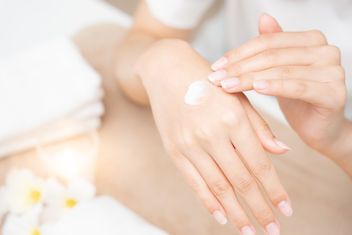Coping with Skin Conditions During the Winter
January 18, 2022Winter weather can wreak havoc on many things, including your skin. The arid, cold air can lead to dry, cracked skin. It can make things especially worse if you suffer from preexisting skin conditions. Read on for tips on coping with skin conditions during the winter.

The Inside Rx Blog
Get the Inside Scoop on tips & tricks that may help your family save on prescriptions!
Subscribe to stay up to date with the latest news and tips
Changes in the weather can have harsh effects on the skin, especially during the winter. From the dry, frigid air outside to the warm, low-humidity air inside, skin can get sapped of moisture. Dry skin can then become irritated and inflamed, leading to red, cracked skin.
In some cases, a lack of moisture in the skin can become serious and may signal a latent skin issue or health condition. The dry winter air can sometimes trigger flare-ups of skin conditions, including rosacea, eczema, and psoriasis. If your skin appears cracked, sore, or bleeding, and over-the-counter medications or at-home treatments aren’t helping, consider visiting a dermatologist for further guidance.
Moisturize Daily
You should try to apply a moisturizer or lotion daily, especially after bathing or washing your hands. In general, a thick, oil-based product like petroleum jelly can help lock in moisture and provide a protective barrier against the elements.
To reduce the greasy feel of petroleum jelly and thick creams, rub a small amount in your hands, and then coat it over the affected areas until neither your hands nor the affected areas feel greasy.
You may have to experiment with different products to find the best moisturizer for your skin.

How to Choose the Right Sunscreen for Your Skin

Psoriasis Awareness: Ways to Get Involved This Psoriasis Action Month

What are the causes of Psoriasis

How to Relieve Pain From Moderate to Severe Plaque Psoriasis
Minimize the Use of Irritating Products
In line with moisturizing daily, you’ll want to minimize your use of irritating products on your skin. Scented soaps and beauty products may contain synthetic fragrances that can irritate the skin.
Some skin cleaners contain chemicals and harsh exfoliants that can trigger a flare-up. If you have sensitive skin, you may want to avoid products with sodium lauryl sulfate, which can irritate the skin.
Ingredients that trigger a flare-up can vary by individual. However, it’s never a bad idea to avoid deodorant soaps, perfumed soaps, and products containing alcohol, which can deprive your skin of natural oils.
Use a Humidifier
Dry air can disrupt healthy skin processes. For example, low humidity has been found to decrease skin elasticity and cause a rough appearance of the skin. Dry air can also trigger inflammation and flare-ups of conditions like atopic dermatitis, especially in children who tend to have more sensitive skin than adults.
To help fight low humidity, you may want to invest in a high-quality humidifier to use inside during the winter. Set it to between 40 and 60%, the ideal level to ensure adequate moisture and comfort.
Limit the Use of Hot Water
Hot water can irritate the skin and worsen itching, especially in people with eczema. Limit yourself to no more than a 5 to 10-minute bath or shower. If you bathe more than that, you may strip away much of the skin's oily layer and cause it to lose moisture. Opt for lukewarm water rather than hot water, which can wash away natural oils.
Use a Light Touch
To reduce the risk of irritation to your skin, be wary of bath sponges, scrub brushes, and even washcloths. If you don't want to forgo these comforts, be sure to use a light touch. Don’t rub your skin when drying off. Instead, pat dry your skin.
Do not scratch your skin. In most cases, a moisturizer can relieve any itching you might experience. You can also apply a cold pack or compress the irritated area for relief.
During a shave, use a shaving cream or gel and leave it on your skin for a minute or two before starting. Letting the cream or gel lather on the skin can help soften the hair for a better shave.
Additional Tips to Help Skin Conditions
- Consistently apply sunscreen in both the winter and the summer to prevent photoaging.
- Use fragrance-free laundry detergents and avoid fabric softeners.
- Avoid wearing wool and other fabrics that can irritate the skin.
If your skin condition persists or becomes aggravated, then prescription medication, either topical or oral, is the next step.
Prescription treatments can be expensive. In the event you don’t have insurance or your plan doesn’t provide sufficient coverage, there are savings options available.
Atenolol
$ 7.53Sildenafil Citrate
$ 12.54Inside Rx Is Here to Help
One way to save on brand-name or generic medications is to use a discount savings such as Inside Rx. The Inside Rx prescription savings card is accepted at over 60,000 pharmacies nationwide. You can find the best price for your medications by comparing prices on the Inside Rx website.
Simply present your discount card to your pharmacist with your prescription. You may be able to save up to 80% on both brand-name and generic drugs. You can download a free Inside Rx card to start saving today. To learn more about Inside Rx, visit our Help page.